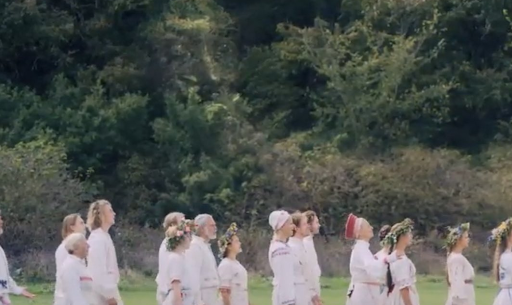Ari Aster and The Art of the Finale

When watching a good ending, it’s never the moment while watching you remember, it’s the following one.
The clenched sweaty palms, the smile stuck on your face, the tears dripping off your chin- The ultimate goal of a movie is to immerse you in its setting, so that feeling you get when you are pulled out is indescribable. What it’s like to leave the theater thinking.
Director Ari Aster relishes in that feeling.
His debut film Hereditary in 2018 garnered large attention specifically for it’s visual trickery- It is a film with HUGE replay value as the descent into madness is portrayed in every second, even those that may seem useless on first watch. Hereditary presents us with a dysfunctional family living through a recent loss; their grandmother.
Grief plays a big part in this film and more importantly are the characters’ responses to this grief. The mother copes with an extremely open sadness that can only be quenched through the voice of a woman she meets- who we later find out is a puppet for a cult the grandmother was a part of.
The father bites his tongue for the most part, mostly intuitively enforcing some of the anger the rest of the family pushes onto him. He plays a huge part in the film that many miss- By absorbing and suppressing some of the anger, guilt and most prominently grief, he helps push some of the others onto the metaphorical sword that the ending points at the others.
The brother is a mold for the cult to exploit, and as the film progresses, his actions become too much for him to bear and the reality of his situation breaks him. Like I said before, the goal of the film is to immerse, and unfortunately this might have worked too well on Alex Wolff, the actor. He had to take therapy after production was finished because he was so engrossed in his role.
It seems too late we realize the pawns in play, and at the climax of the film, we lose most of the family to the cult’s plan. The music kicks in, and the curtains begin to close. There were several shots of the exterior of the house where day turned to night with a single stationary cut. To me that was a light switch being switched on or off, implying that the house was a dollhouse all along, and that none of the characters had any control over their fate. They were just being moved around in someone else’s dollhouse.
One of the best elements of Ari Aster’s endings are his composer choices. This film’s finale ends with “Reborn” by Colin Stetson, an experimentalist saxophone player. His works include heavy usage of arpeggios- a chord played in rising order. In this film, the cult has won, and their plan has come to fruition. The demon they hail to is a pagan one, and his entrance is biblically characterized by bells and trumpets. The song sounds like a triumphant party, a victorious day for the cult. A resounding and almost alien synth line resounds as we see the soulless eyes of the final family member, possessed and surrounded by joyous cult members hailing him.
The most eerie thing about the song is how it feels; a victory for the enemy- a happy day for the villains.
His second film was very similar in some aspects, focusing on the horror that can be utilized from pagan culture. Instead of loss and its subsequent reactions, his second film Midsommar chooses to focus on trauma, and its subsequent reactions.
Midsommar is a film that can be viewed most vividly through the eyes of the manipulated.
While Hereditary clearly shows us the wrong within its moments, it clearly shows us that the family is being tricked, not the audience. We simply get to watch the pieces fall into place. With Midsommar, a lot of these moments of horror are being excused to us, not just the characters at play. Take for example the tradition of the elderly taking their lives- the moment in the film is shocking, but at many points it can be seen as a normality of the religion. This also builds on that theme of immersion Aster is so familiar with.
The inception of the film focuses on the anchor of our main character Dani’s struggle; the suicide of her sister and murder of her parents. Constantly the film brings us back to this moment, revealing imagery of the event in front of us, and also subconsciously.
This moment in the film is only a few seconds, but on rewatch I was able to spot the face of Dani’s sister molded into the foliage.
Before the group of Americans are introduced to the world of the Pagans, they decide to take some psychedelics to pass the time. During this, Dani has a horrible trip, watching the mountainous landscape sway and bob like waves of a stormy sea. Near the climax and ultimate finale of the film, the hills sway like they did before, only this time the abnormal bobbing hasn’t been made a part of a shroom-induced panic attack- the bobbing hills have become the normality. This was another element I didn’t notice until a rewatch.
All of these things work together; consciously and subconsciously, to create a watch that is exempt from subjection.
The ending brings us to a moment where Dani has completely undergone the cult’s wishes; she has become an indoctrinated may-queen. The rest of the visitors are brought within a yellow pyramid, and it is set ablaze. Dani, completely smothered in a massive flower dress, begins to cry and wail as the music loudens.
For a brief moment, Dani looks back upon the hundreds of cult members, shaking, screaming, and writhing- trying to imitate the pain of those trapped within the pyramid. As she looks over, the uplifting orchestral music starts to decline into a horrid, petrifying nose dive. For the viewer, we realize what the final page of the book has become.
Dani looks back at the pyramid, its structure reduced to burning wood, and the grief-stricken face of sadness breaks into a smile. She is a part of the cult, but at this moment, none of that matters. The music settles onto a resounding note, and the film draws to a close.
Aster has always crafted perfect finales, and if either of those movies sounded interesting to you, and you want to experience them yourself, Hereditary and Midsommar are available on HBO Max, Amazon, Hulu, and Netflix. Asters latest film, Beau is Afraid, Has just recently been released, so if you want a fresh watch, check for any showings nearby.

Ciaran is a Senior returning to the staff team for his fourth year of writing and designing. He will also be collaborating with Cali as one of the managing...
